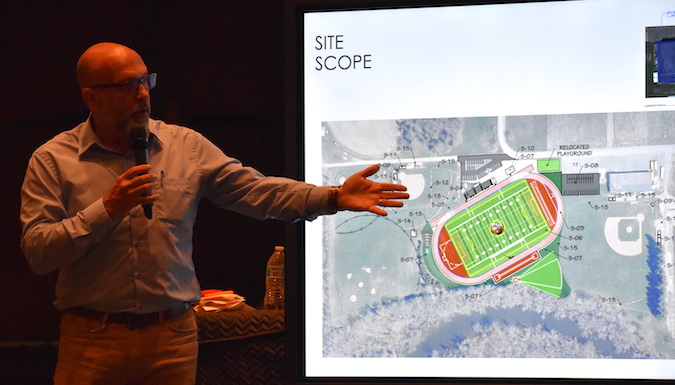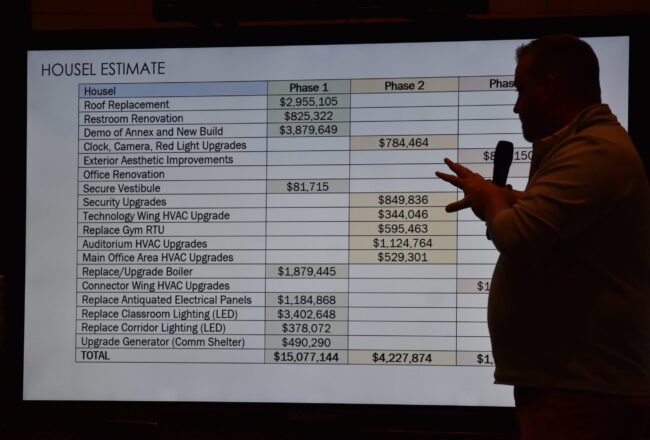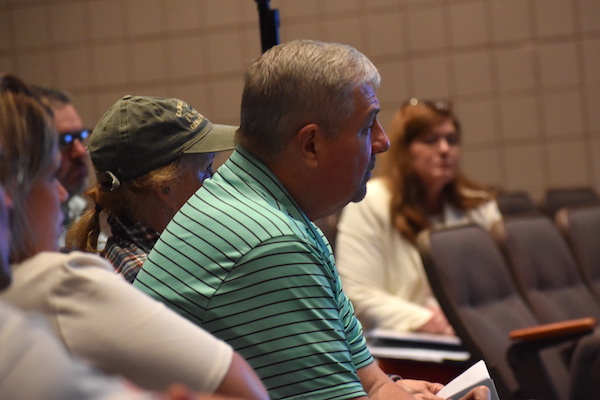Lyndonville works to trim capital project at school district
School officials eyeing about $24 million in improvements, with more in next phase including possible turf field

Photo by Tom Rivers: David Kenyon, senior landscape architect, presents a rendering for a turf field at the Lyndonville, a project that school officials said will have to be pushed back for another capital project, not the one that could go to a public vote in November or December.
LYNDONVILLE – School officials are working with engineers and architects at the Wendel firm to pare down a list of projects to upgrade the school district.
An initial list of facility upgrades and site improvements at the district came in at $50 million.
That’s about twice what the district can spend with its state aid and also a district capital reserve. Lyndonville won’t pursue a project that increases local taxes, the board said at the meeting last Thursday.
The district and Wendel have grouped those projects in three phases, but some things in phase one will need to be removed to get the costs down.
School officials will try to finalize a list in the next month with the project to go to a public vote possibly in mid-November or December.
“Right now this is really big picture,” said Justin Parish, lead project architect from the Wendel firm.
He and three of his Wendel colleagues went over the costs of the project on Thursday evening with the Board of Education.
The prices listed anticipate a construction schedule two years from now in 2025 when costs are expected to be up another 16 percent, Parish said.
Lyndonville has a three-phase project to try to include all items identified to upgrade the school district.
But for now phase one tentatively includes:
The Main Street school building – $11,299,786
- replace/upgrade boiler – $5,491,248
- air-conditioning throughout building – $5,293,008
- restroom renovation – $499,777
- brick repair –$15,753
This school building was closed for a few years but reopened during the Covid pandemic in 2020-21. That building allowed Lyndonville to space out students and have in-person classes all five school days each week, while most other districts were on an alternating hybrid schedule.
Lyndonville now uses the Main Street site for ages 3 and 4 all-day prekindergarten, and first and second grades.
Housel Avenue school – $15,077,144
- demolition of annex and new build – $3,879,649
- roof replacement – $2,955,105
- replace/upgrade boiler – $1,879,445
- replace antiquated electrical panels – $1,184,868
- restroom renovation – $825,322
- upgrade generator (comm shelter) – $490,290
- secure vestibule – $81,715

Justin Parish, lead project architect, goes over the list of items identified for the school building on Housel Avenue.
Site improvements – $10,613,584 for phase one
- turf field – $3,623,190
- turf field lighting – $1,339,005
- 6-lane rubber track – $2,362,950
- softball and baseball lighting – $1,831,286
- scoreboard for turf field – $551,973
- bus garage parking lot – $511,973
- concession stand with bathrooms – $393,825
In phases 2 and 3, the list includes an accessible playground ($708,885), courtyard design ($511,973), 1,000 seat bleachers with press box ($787,650), bleachers for softball/baseball ($236,295), pickle ball court ($291,430), baseball/softball drainage ($15,753), 10-by-10 foot storage shed ($47,259) and miscellaneous site and lighting upgrades ($551,355).
Bus garage – $574,456 for a roof replacement.
In phase 3, the district should consider an overhead door replacement ($169,943), restroom addition ($70,889) and other mechanical, electrical and plumbing upgrades ($1.3 million).
Lyndonville already announced parts of phase one have been eliminated, including the turf field, new track and lighting and scoreboard for the turf field.
Under the current maximum cost allowances for state aid, Lyndonville would receive up to $19,572,061 in state funding for construction and another $4,582,426 for incidentals (site work and soft costs), or $24,154,487 altogether.
The construction projects identified by the school committee and Wendel officials totaled $29,522,394 (or $9,950,333 over the maximum state aid.) The incidentals totaled $21,236,830 (or $16,654,494 over the state aid).
The district’s construction committee will meet again this week to review the project and try to narrow the scope.
Parish, the lead project architect, said the construction numbers are conservative, and it’s possible the costs may be less when the project is bid which would allow Lyndonville to include more items in phase one.
Phases two and three would need to be spaced out about every five years to allow Lyndonville to be eligible for more state aid towards a capital project.
Parish suggested the costs would be in line financially for the total project by cutting most of the site improvements, and instead only doing $433,208 in that category – $393,825 for a concession stands and bathrooms, $23,630 for baseball/softball scorebooths, and $15,753 for baseball/softball drainage.
Sharon Smith, the district superintendent, said it was a “gut punch” to have to cut the new track and turf field.
“We’ve taken our hopes and dreams and tried to set priorities,” she said.

Ted Lewis, president of the Lyndonville Board of Education, listens to a presentation from engineers and architects at the Wendel firm on Thursday evening.






































































